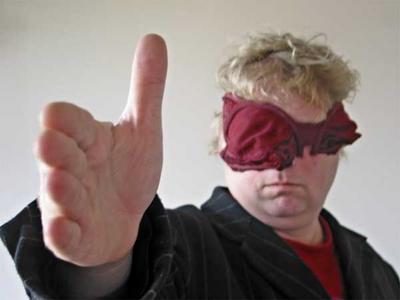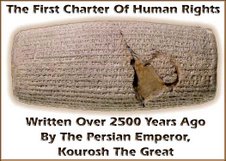




This is a picture of the production guys from Spine Films who produced this very well-done documentary for TLC. It featured Elizabeth's FFS experience, as well as a small bit from yours truly. by
duzdonna
Maryam Molkara was a woman trapped in a man's body. She was also living under Islamic law in the Iran of Ayatollah Khomeini. Yet, as Robert Tait reports, her determination to confront the hallowed leader has made Tehran the unlikely sex-change capital of the world
Robert Tait
Wednesday July 27, 2005
Guardian
It could take something extraordinary to move the late Ayatollah Ruhollah Khomeini to issue a fatwa. The novelist Salman Rushdie did it by challenging the sanctity of the Prophet Mohammed in the Satanic Verses, provoking Iran's austere revolutionary leader into pronouncing the death sentence. For Maryam Khatoon Molkara it required the equally dramatic step of confronting Khomeini in person and proving, in graphic terms, that she was a woman trapped inside a man's body. Article continues
Iran's sex-change operations By Frances Harrison The BBC's Tehran correspondent
In a country that has outlawed homosexuality, Frances Harrison meets one Iranian cleric who says the right to a sex change is a human right.
He's surprised to learn in Britain a transsexual who's had a sex change operation cannot change his or her gender on their birth certificate.
August 2, 2004 By NAZILA FATHI TEHRAN
Aug. 1 - Everything about Amir appears masculine: his broad chest, muscled arms, the dark full beard and deep voice. But, in fact, Amir was a woman until four years ago, when, at the age of 25, he underwent the first of a series of operations that would change his life. Since then he has had 20 surgical procedures and expects another 4. And Amir, who as a woman was married twice to men - his second husband helped with the transition and remains a good friend - is now engaged to marry a woman. "I love my life and I'm happy, as long as no one knows about my past identity," said Amir, who asked that his full name not be published. "No one has been more helpful than the judge, who was a cleric and issued the permit for my operation." After decades of repression, the Islamic government is recognizing that some people want to change their sex, and allowing them to have operations and obtain new birth certificates. Before the Islamic Revolution in 1979, there was no particular policy regarding transsexuals. Iranians with the inclination, means and connections could obtain the necessary medical treatment and new identity documents. The new religious government, however, classed transsexuals and transvestites with gays and lesbians, who were condemned by Islam and faced the punishment of lashing under Iran's penal code. But these days, Iran's Muslim clerics, who dominate the judiciary, are considerably better informed about transsexuality. Some clerics now even recommend sex-change operations to those who are troubled about their gender. The issue was discussed at a conference in Tehran in June that drew officials from other Persian Gulf countries. One cleric, Muhammad Mehdi Kariminia, is writing his thesis on transsexuality at the religious seminary of Qum. "All the clerics and researchers at the seminary encouraged me to work on the subject," he said in an interview. "They said that my research can help change the social stigma attached to these people and clarify religious decrees on the matter." One early campaigner for transsexual rights is Maryam Hatoon Molkara, who was formerly a man known as Fereydoon. Before the revolution, under the shah, he had longed to become a woman but could not afford surgery. Furthermore, he wanted religious guidance. In 1978, he wrote to Ayatollah Ruhollah Khomeini, who was to become the leader of the revolution but was still in exile, explaining his situation. The ayatollah replied that his case was different from that of a homosexual and therefore he had his blessing. However, the revolution intervened and men like himself or those who had already changed their sex were harassed, even jailed and tortured. "They made me stop wearing women's clothes, which I had worn for many years and was used to," Ms. Molkara recalled. "It was like torture for me. They even made me take hormones to look like a man.'' It took him eight years after the revolution, in 1986, to get government permission to proceed with surgery. But he could not afford the surgery and did not have it until 1997, when he underwent a sex-change operation in Bangkok. The Iranian government covered the expenses. Four years ago, Ms. Molkara established an organization to help those with gender-identity problems. Co-founders include Ali Razini, head of the Special Court of Clergy, a branch of the judiciary that only deals with clerics, and Zahra Shojai, Iran's vice president for women's affairs. An Islamic philanthropic group known as the Imam Khomeini Charity Foundation has agreed to provide loans equivalent to about $1,200 to help pay for sex-change surgery. To obtain legal permission for sex-change operations and new birth certificates, applicants must provide medical proof of gender-identity disorder. The process can take years. It also involves considerable expense. In Tehran, the initial male-to-female surgery runs about $4,000. So far, Amir has spent $12,000 on medical procedures. The people who pursue this route come from many different backgrounds. Dr. Bahram Mir-djalali, one of Tehran's few sex-reassignment surgeons, said one of his patients had been a member of the Revolutionary Guards who served five years in the war with Iraq. His operation was paid for by a Muslim cleric he had worked for as a secretary. After the surgery, the man-turned-woman divorced, and then married the cleric. "When she came to see me years later, she was wearing a chador," the doctor recalled, referring to the black head-to-toe garb worn by religious women. "She took off the chador, and there was no sign of the bearded man I had operated on." But many who cannot deal with the legal and financial obstacles to a surgical solution have to deal with humiliation in their daily lives. One 27-year-old man said he ran away from home at the age of 14 because he did not dare tell his family of his urge to become a woman. He wants to be known as Susan and wears women's clothes at home but only emerges dressed that way at night. He says the constant need for secrecy has left him severely depressed, and he has attempted suicide several times. "I have suffered all my life,'' he said, constantly adjusting his long curly hair to cover his sideburns. "People treat me as though I have come from Mars. Women pull my hair and laugh at me on the street. Most men I am attracted to reject me." In a society where men enjoy a higher status than women, the stigma against any man who wants to be a woman is especially strong. "They compliment a girl who behaves and dresses like a man as a strong person, but they look down at us and despise us," said Assal, who was disowned by her father for having surgery to become a woman. Dr. Mir-djalali said he had to fight on many fronts to help more than 200 patients who had consulted him in the 12 years he had performed sex-change operations. Even if Iran's Muslim clerics are more understanding now of transsexuals' needs, others lag behind. "We have a problem even deciding at which hospital to do the surgery because society considers these people deviant," he said. "Hospital officials have reacted negatively because they say other patients do not like the looks of my patients." He said one patient's father pulled a knife on him in his office, and threatened to kill him if he touched his son. "What we really need to help these people,'' Dr. Mir-djalali said, "is a serious cultural campaign."
Some useful links:
از ديگر رسانه ها افزايش عمل های جراحی تغيير جنسيت در ايران؛ گزارشی از نيويورک تايمز










